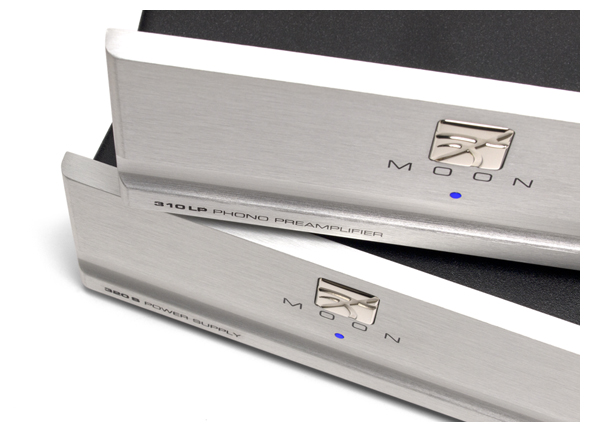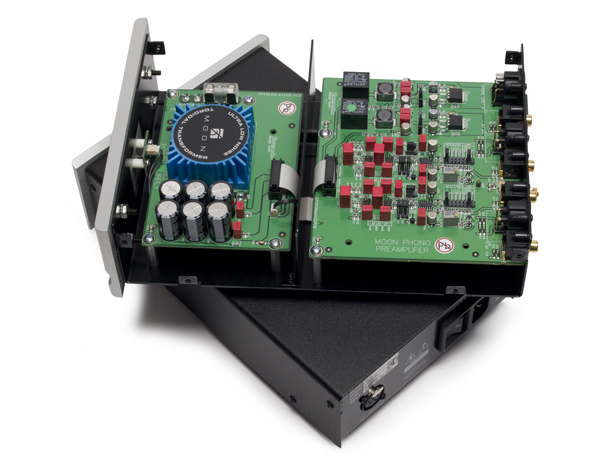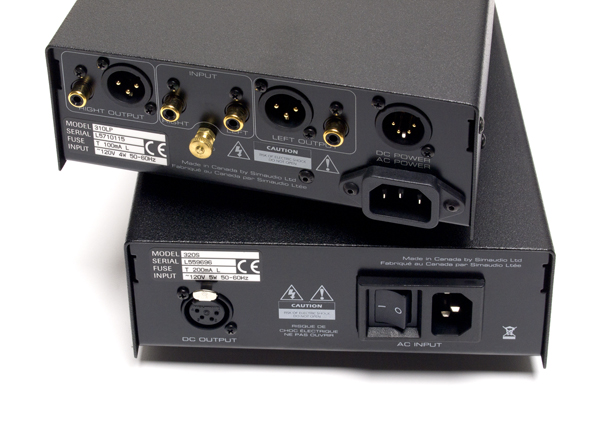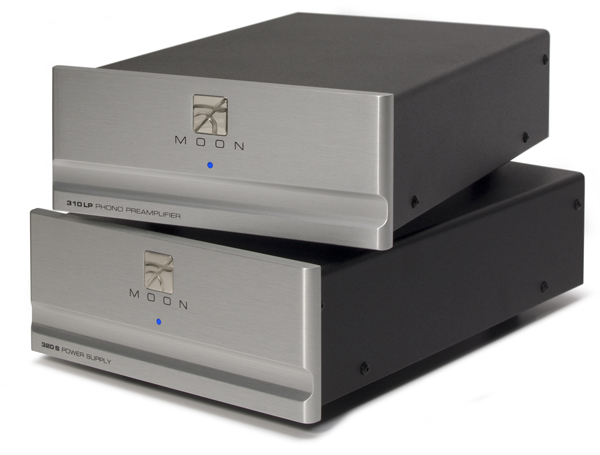REVIEW: Simaudio MOON 310LP and 320S

Since even the very best hi-fi systems rarely sound like real live music, the first question one might ask about the sound of any component immediately becomes: What does it add and what does it take away from the music?
Creating the perfect recreation of live music in the home may have yet to happen, but it’s not totally the fault of the hi-fi. Few recordings are made with the intention of capturing reality; artists, producers, and engineers are usually searching for the sound they think best suits the music. And since music is recorded in an endless variety of venues and recording chains, it’s no wonder that recordings all sound very different from each other.
That said, my favorite systems are those that reveal such differences between recordings every time you change a disc. The less a system adds or subtracts from the sound, the easier it is to really hear what’s going on in the recording. By this standard, Simaudio’s MOON 310LP phono preamp is a winner.
Surprises on the Inside
The MOON 310LP replaces Simaudio’s MOON LP5.3 phono preamp. The new model isn’t a radical rethink of the previous design, but it combines superior parts and a quieter power supply to achieve better performance. And for those that invest for the long haul,the MOON 310LP comes with a 10-year warranty.
Taking off the easily removable case cover reveals the MM and MC settings. MC gain has three options: 54, 60,and 66db through RCA outputs, with an additional 6db available through XLR outputs. Five impedance settings (10, 100, 470, 1K, and 47kΩ) are available for both MM and MC, meaning those with a Grado or SoundSmith moving-iron cartridge can take advantage of the higher-gain settings. Capacitive loading can be set at 0, 100, and 470pf—a bonus for MM users, as it offers more flexibility. The 310LP even offers a jumper setting for RIAA or IEC equalization. While not terribly convenient to access, such functionality isn’t often seen at this price point.
The unit’s rear panel hosts single-ended RCA inputs and outputs, plus balanced XLR outputs. The 310LP is nice and compact, just 7.5″ x 3.2″ x 11.2″ and weighing it at 7 pounds.
 Redefines Quiet
Redefines Quiet
Usually, on most phonostages, associated noise occurs when lifting the stylus from the groove at a high volume level. I can often hear such noise from my listening position, which is about ten feet from my Magnepan 3.7 speakers. However, with the 310LP, I only detected the faintest of noise, and only when my ears were pressed right against the speakers—a good sign. Even more importantly, the 310LP sounds cleaner when the music is cranked up, meaning that the contrast between quiet and loud instruments is more apparent than what I’ve experienced from other phonostages in this range.
Richard Barone’s Cool Blue Halo was recorded live at the Bottom Line on May 31, 1987. I was at the show, so listening to the LP is like traveling back through time. I loved that club, and saw hundreds of shows there. Plus, the Bottom Line always had an above-average sound system. However, Barone’s live sound that late spring night wasn’t very good, and it comes through on the LP. Just like the actual concert, there’s too much reverb. But Barone’s vocals sound great, and the Bottom Line’s vibe is there. The 310LP brings it all back to life just as I remembered.
Emotional Rescue, one of the Rolling Stones’ last all-analog efforts, also lit up my speakers. On the title track, drummer Charlie Watts, bassist Bill Wyman, and singer Mick Jagger dominate the mix. Via the 310LP, their pounding groove instantly grabs my attention and connects me to the music. Similarly, “She’s So Cold” transfixes, as I love the way Keith Richards’ rhythm-guitar licks punctuate the beat. I’ve never enjoyed this record more than I do with the 310LP. Tom Petty and the Heartbreakers’ debut possesses even more analog richness than Emotional Rescue. Again, the 310LP helps portray the big soundstage present on this record with ease.
In the female vocal field, Linda Rondstadt’s Don’t Cry Now sounds tighter and more produced—like a recording where every musician is recorded in total isolation from one other. Her take on Neil Young’s “I Believe In You” is simply gorgeous on the 310LP. The latter is undoubtedly a high-resolution design, but one that doesn’t throw detail at you in a way that becomes fatiguing.
On the LP310, some of the better 1950s-era jazz recordings sound more natural to me, perhaps because they have little equalization or studio processing. Clarinetist Jimmy Giuffre’s LPs are so present and tonally accurate that the instruments seemingly appear in the room with me. I didn’t even notice at first that they’re mono recordings!
 Back to Basics
Back to Basics
Initially, I used the 310LP with the optional 320S power supply, which looks nearly identical to the 310LP. A dedicated and optimized design that only works with the 310LP, it features four stages of DC voltage regulation in a dual-action configuration and a special “pi-type” filter in conjunction with a dual-voltage regulation system to further reduce the 310LP’s already low-noise level.
Fully acclimated to the sound of the 310LP/320S combo, I unhitched the power supply, a change that involves moving a couple of internal jumpers. Listening to the 310LP a la carte, the sound becomes a tad softer. And, in comparison to hearing them via the Simaudio duo, dynamics are blunted, with low-level resolution and air also somewhat diminished.
Those with fairly resolving systems will have a tough time living without the 320S. The device is well worth the money, yet it’s also nice that Simaudio gives you the option to buy into its phonostage one step at a time.
Turn Me On
A few months ago, I had the pleasure of reviewing the Red Wine Audio Ginevra LFP-V Edition phono preamp. It’s a battery-powered, hybrid tube/solid-state design. Yet, it’s very tubey in the sense that the sound is rich and velvety smooth, albeit never lacking in detail. It proved a great experience, but the 310LP turns me on in a very different way. The Ginevra’s beguiling sweetness softens the top- and bottom-end response, whereas in these areas, the 310LP is more neutral.
Dr John’s In the Right Place, arranged and produced by the great Allen Toussaint in 1979, yields pure thrills through the 310LP. The Doctor’s mojo fires on all cylinders, and the Sim unit simply lets be the yummy, bold, 3D, and oh-so funky sound. Sure, some of the better and vastly more expensive phono preamps can get you even closer to the music embedded in the grooves, but in its price class, the 310LP is as colorless a device as you’re going to find.
The TONEAudio staff agrees, and hails the 310LP/320S as a recipient of one of the magazine’s 2011 Exceptional Value Awards.
 Manufacturer Information
Manufacturer Information
Simaudio MOON 310LP and MOON 320S
MSRP: $1,800/$1,400
Peripherals
Analog Source: VPI Classic turntable with a van den Hul Frog cartridge
Digital Sources: PS Audio PerfectWave Transpost and DAC; MSB Technology Platinum Data CD IV Transport and Platinum Signature DAC IV; Oppo BDP-95 Special Edition
Electronics: Pass XP-20 preamp; Whest 2.0 phono preamp; Pass Labs XA100.5 and First Watt J2 power amps
Speakers: Dynaudio C-1; Mangepan 3.7
Cable: XLO Signature 3 interconnects; Analysis Plus Silver Oval interconnects and speaker cables; Audioquest Sky interconnects



